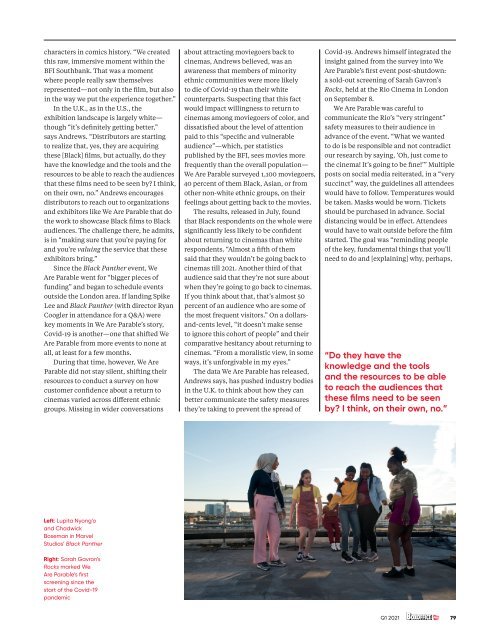Boxoffice Pro Q1 2021
Boxoffice Pro is the official publication of the National Association of Theatre Owners.
Boxoffice Pro is the official publication of the National Association of Theatre Owners.
You also want an ePaper? Increase the reach of your titles
YUMPU automatically turns print PDFs into web optimized ePapers that Google loves.
characters in comics history. “We created<br />
this raw, immersive moment within the<br />
BFI Southbank. That was a moment<br />
where people really saw themselves<br />
represented—not only in the film, but also<br />
in the way we put the experience together.”<br />
In the U.K., as in the U.S., the<br />
exhibition landscape is largely white—<br />
though “it’s definitely getting better,”<br />
says Andrews. “Distributors are starting<br />
to realize that, yes, they are acquiring<br />
these [Black] films, but actually, do they<br />
have the knowledge and the tools and the<br />
resources to be able to reach the audiences<br />
that these films need to be seen by? I think,<br />
on their own, no.” Andrews encourages<br />
distributors to reach out to organizations<br />
and exhibitors like We Are Parable that do<br />
the work to showcase Black films to Black<br />
audiences. The challenge there, he admits,<br />
is in “making sure that you’re paying for<br />
and you’re valuing the service that these<br />
exhibitors bring.”<br />
Since the Black Panther event, We<br />
Are Parable went for “bigger pieces of<br />
funding” and began to schedule events<br />
outside the London area. If landing Spike<br />
Lee and Black Panther (with director Ryan<br />
Coogler in attendance for a Q&A) were<br />
key moments in We Are Parable’s story,<br />
Covid-19 is another—one that shifted We<br />
Are Parable from more events to none at<br />
all, at least for a few months.<br />
During that time, however, We Are<br />
Parable did not stay silent, shifting their<br />
resources to conduct a survey on how<br />
customer confidence about a return to<br />
cinemas varied across different ethnic<br />
groups. Missing in wider conversations<br />
about attracting moviegoers back to<br />
cinemas, Andrews believed, was an<br />
awareness that members of minority<br />
ethnic communities were more likely<br />
to die of Covid-19 than their white<br />
counterparts. Suspecting that this fact<br />
would impact willingness to return to<br />
cinemas among moviegoers of color, and<br />
dissatisfied about the level of attention<br />
paid to this “specific and vulnerable<br />
audience”—which, per statistics<br />
published by the BFI, sees movies more<br />
frequently than the overall population—<br />
We Are Parable surveyed 1,100 moviegoers,<br />
40 percent of them Black, Asian, or from<br />
other non-white ethnic groups, on their<br />
feelings about getting back to the movies.<br />
The results, released in July, found<br />
that Black respondents on the whole were<br />
significantly less likely to be confident<br />
about returning to cinemas than white<br />
respondents. “Almost a fifth of them<br />
said that they wouldn’t be going back to<br />
cinemas till <strong>2021</strong>. Another third of that<br />
audience said that they’re not sure about<br />
when they’re going to go back to cinemas.<br />
If you think about that, that’s almost 50<br />
percent of an audience who are some of<br />
the most frequent visitors.” On a dollarsand-cents<br />
level, “it doesn’t make sense<br />
to ignore this cohort of people” and their<br />
comparative hesitancy about returning to<br />
cinemas. “From a moralistic view, in some<br />
ways, it’s unforgivable in my eyes.”<br />
The data We Are Parable has released,<br />
Andrews says, has pushed industry bodies<br />
in the U.K. to think about how they can<br />
better communicate the safety measures<br />
they’re taking to prevent the spread of<br />
Covid-19. Andrews himself integrated the<br />
insight gained from the survey into We<br />
Are Parable’s first event post-shutdown:<br />
a sold-out screening of Sarah Gavron’s<br />
Rocks, held at the Rio Cinema in London<br />
on September 8.<br />
We Are Parable was careful to<br />
communicate the Rio’s “very stringent”<br />
safety measures to their audience in<br />
advance of the event. “What we wanted<br />
to do is be responsible and not contradict<br />
our research by saying, ‘Oh, just come to<br />
the cinema! It’s going to be fine!’” Multiple<br />
posts on social media reiterated, in a “very<br />
succinct” way, the guidelines all attendees<br />
would have to follow. Temperatures would<br />
be taken. Masks would be worn. Tickets<br />
should be purchased in advance. Social<br />
distancing would be in effect. Attendees<br />
would have to wait outside before the film<br />
started. The goal was “reminding people<br />
of the key, fundamental things that you’ll<br />
need to do and [explaining] why, perhaps,<br />
“Do they have the<br />
knowledge and the tools<br />
and the resources to be able<br />
to reach the audiences that<br />
these films need to be seen<br />
by? I think, on their own, no.”<br />
Left: Lupita Nyong’o<br />
and Chadwick<br />
Boseman in Marvel<br />
Studios’ Black Panther<br />
Right: Sarah Gavron’s<br />
Rocks marked We<br />
Are Parable’s first<br />
screening since the<br />
start of the Covid-19<br />
pandemic<br />
<strong>Q1</strong> <strong>2021</strong><br />
79<br />
76-80_We-Are-Parable.indd 79 15/02/<strong>2021</strong> 15:29

















